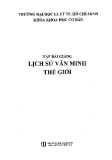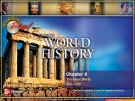Splash Screen
Chapter Introduction
Section 1: Transforming the
Roman World
Section 2: Feudalism
Section 3: The Growth of
European Kingdoms
Section 4: Byzantine Empire and Crusades
Visual Summary
Chapter Menu
From ancient times, Carcassonne was important because of its location near the Pyrenees Mountains. The Romans built fortifications on the hilltop and each ruler added to them until the 1600s. A fortified city like Carcassonne, with a double ring of defensive walls and 53 towers, could hold out for months against an army. In this chapter you will learn about the beginning of the Middle Ages.
• What was the advantage of locating
a city on a hilltop?
• Why might castles and fortified towns
become impractical?
Chapter Intro
How important is the location of a city?
Chapter Intro
Chapter Intro
Transforming the Roman World
Why was Rome the center of the Christian world at the beginning of the period?
Chapter Intro 1
Feudalism
What purpose does a strong central government serve?
Chapter Intro 2
The Growth of European Kingdoms
How do you think the Magna Carta affected the development of the U.S. government?
Chapter Intro 3
Byzantine Empire and Crusades
What was the purpose of the Crusades?
Chapter Intro 4
Chapter Preview-End
The BIG Idea
Ideas, Beliefs, and Values The new European civilization combined Germanic, Roman, and Christian elements.
Section 1-Main Idea
• wergild
• monasticism
• ordeal
• missionary
• bishopric
• nun
• pope
• abbess
• monk
Content Vocabulary
• excluded
• ensure
Section 1-Key Terms
Academic Vocabulary
• Clovis
• Gregory I
• Saint Benedict
• Pépin
• Charlemagne
• Carolingian Empire
Section 1-Key Terms
People and Places
Do you think that in our society, every personal crime should have a monetary value paid as a fine to the victim?
A. Yes
B. No
A. A B. B
0%
0%
Section 1-Polling Question
The New Germanic Kingdoms
The Frankish kingdom was the strongest of the early German states and developed new laws based on the importance of family in Germanic society.
Section 1
The New Germanic Kingdoms (cont.)
• By 500 A.D., the Western Roman Empire had been replaced by Germanic kingdoms that eventually excluded Romans from holding power.
• Clovis established the kingdom of the
Franks. He was the first Germanic ruler to convert to Christianity and become allied with the Roman Catholic Church.
New Germanic Kingdoms, A.D. 500
Section 1
The New Germanic Kingdoms (cont.)
• As Germans and Romans intermarried, they created a new society. The family was the key social bond of the society and impacted the Germanic legal system.
• The Germans devised a legal system based
Section 1
on a fine called a wergild paid by the wrongdoer to the victim’s family. The value of the fine varied according to social status, so it cost more to commit an offense against a noble than a slave.
The New Germanic Kingdoms (cont.)
Section 1
• The ordeal was a system to establish guilt or innocence through a physical trial. It was based on the belief in divine intervention.
What was the significance of Clovis’s conversion to Christianity?
A. It changed Germanic law.
B. It prevented the spread of Islam in Western Europe.
C. It divided the Germanic
kingdoms.
0%
0%
0%
0%
D. It unified the Franks and
A. A B. B C. C D. D
the Roman Catholic Church.
Section 1
The Role of the Church
The Bishop of Rome became the leader of the Christian Church.
Section 1
The Role of the Church (cont.)
• By the end of the fourth century, Christianity had become the dominant religion of the Roman Empire, and the Church developed a system of organization.
• Priests led parishes; groups of parishes
Section 1
became known as bishoprics that were led by bishops. Bishoprics were, in turn, under the authority of an archbishop.
The Role of the Church (cont.)
• The head of the Catholic Church became
known as the pope.
• Gregory I, pope from 590 to 604, strengthened the power of the papacy. He converted non- Christians and increased his spiritual authority over the Church.
• The practice of living the life of a monk is known as monasticism. Saint Benedict wrote a series of rules that became the model for monasticism.
A Monk’s Daily Timetable
Section 1
The Role of the Church (cont.)
• Monks became Christian heroes in the new
European civilization, providing religious and moral leadership.
• Monks became the missionaries that
converted Western Europe to Catholicism. By 1050, most of Western Europe was Catholic.
• Women could become nuns and live in
Section 1
convents, which were headed by abbesses.
How did Catholic monks impact Western European society?
A. Education and morality
B. Architecture
C. Military training
D. Latin languages
0%
0%
Section 1
A. A B. B C. C 0% 0% D. D
The Carolingian Empire
Charlemagne expanded the Frankish kingdom and created the Carolingian Empire.
Section 1
The Carolingian Empire (cont.)
• Pépin was a chief officer of the Frankish kingdom who assumed the kingship for himself and his family. His son was Charles the Great.
• Charles the Great, or Charlemagne, was an
intelligent leader and fierce warrior who expanded the Frankish kingdom, creating the Carolingian Empire.
The Carolingian Empire
Section 1
The Carolingian Empire (cont.)
• The Carolingian Empire was the largest European empire in history at the time. Charlemagne sent out messengers called the missi dominici to ensure that his wishes were enacted.
• In 800, Charlemagne was crowned emperor
Section 1
of the Roman Empire by the pope. This event symbolized the joining of Roman, Germanic, and Christian elements.
The Carolingian Empire (cont.)
• Charlemagne’s strong desire to promote
Section 1
learning and education is often referred to as the Carolingian Renaissance.
What was given to Charlemagne by the pope in 800?
A. The Roman army
B. All the gold in Rome
C. The castle in Rome
D. The title of Roman
0%
0%
0%
Emperor
Section 1
A. A B. B C. C 0% D. D
Section 1-End
The BIG Idea
Order and Security The collapse of central authority in Europe led to a new political order known as feudalism.
Section 2-Main Idea
•
•
feudalism
feudal contract
•
tournament
• vassal
• chivalry
• knight
•
fief
Content Vocabulary
• enabled
• contract
Section 2-Key Terms
Academic Vocabulary
• Magyars
• Hungary
• Vikings
• Normandy
• Eleanor of Aquitaine
Section 2-Key Terms
People and Places
When a team loses a coach who is a strong leader, the team is automatically weakened.
A. Agree
B. Disagree
A. A B. B
0%
0%
Section 2-Polling Question
The End of the Carolingian Empire
Vikings, Magyars, and Muslims invaded Europe during the ninth and tenth centuries.
Section 2
The End of the Carolingian Empire (cont.)
• After Charlemagne’s death in 814, Europe
was invaded by foreign powers.
• Muslims attacked Southern Europe and France in the ninth and tenth centuries.
• At the end of the ninth century, Magyars settled in the plains of Hungary and attacked central Europe.
Invasions of Europe, 800–1000
Section 2
The End of the Carolingian Empire (cont.)
• The most devastating attacks came from the Vikings. The Scandinavian warriors used longboats that enabled them to attack towns and villages far from the coast.
• Frankish rulers gave the Vikings land in
Normandy and converted the Norsemen to Christianity. The Vikings were made a part of European civilization.
Invasions of Europe, 800–1000
Section 2
Which of the following was not an invading force in ninth-century Europe?
A. Muslims
B. Vikings
C. Egyptians
D. Magyars
0%
0%
Section 2
A. A B. B C. C 0% 0% D. D
The Development of Feudalism
A system of lords and vassals spread throughout Europe after the collapse of the Carolingian Empire.
Section 2
The Development of Feudalism (cont.)
• As a result of invasions, the people of
Western Europe turned to local lords for protection. This led to a social and political system known as feudalism.
• Vassals were men who served a lord in a
military capacity.
Feudalism
Section 2
The Development of Feudalism (cont.)
• Knights came to dominate European
warfare for nearly 500 years.
• Knights had a high degree of social prestige
Section 2
and formed the backbone of European aristocracy.
The Development of Feudalism (cont.)
• Vassals swore allegiance to a lord. In turn, the vassal was given a fief and political control of it.
• The lord and vassal relationship came to be characterized by a set of unwritten rules known as the feudal contract.
Section 2
• Vassals had to perform military service and the lord had to provide land and protection.
What provided the most power in the system of feudalism?
A. Religion
B. Land
C. Castles
D. Money
0%
0%
Section 2
A. A B. B C. C 0% 0% D. D
Feudal Society
Men and women of the nobility were guided by a code of ethical behavior and society’s expectations of their roles.
Section 2
Feudal Society (cont.)
• In Europe during the Middle Ages, society
was dominated by men whose main concern was warfare.
• Nobles and knights attended tournaments, where the knights would demonstrate their fighting skills.
Section 2
• Influenced by the Catholic Church, nobles and knights began to follow an idealized code of ethics called chivalry.
Feudal Society (cont.)
• Lower-class women had few rights, but
aristocratic women had opportunities to play important roles. The lady of the castle supervised affairs for her husband’s absence travel or war.
Section 2
• Eleanor of Aquitaine was an influential woman who was married to the king of France, and later to the king of England.
Why were European tournaments important?
A. European warriors trained and demonstrated fighting skills.
B. They earned valuable money for the lords.
C. They helped spread
Christianity.
0%
0%
0%
0%
D. They allowed European
A. A B. B C. C D. D
warriors to purchase land or supplies.
Section 2
Section 2-End
The BIG Idea
Order and Security During the High Middle Ages, monarchs began to extend their power and build strong states.
Section 3-Main Idea
• common law
• Parliament
• Magna Carta
• estate
Content Vocabulary
• challenge
• document
Section 3-Key Terms
Academic Vocabulary
• William of Normandy
• Otto I
• Henry II
• Slavs
• Thomas à Becket
• Kiev
• Paris
• Alexander Nevsky
• Philip II Augustus
Section 3-Key Terms
Academic Vocabulary
Written documents outlining rights of citizens make governments more fair.
A. Agree
B. Disagree
A. A B. B
0%
0%
Section 3-Polling Question
England in the High Middle Ages
King John of England put his seal on the Magna Carta in 1215, recognizing the rights of his nobles, and keeping the English monarch from ever becoming an absolute ruler.
Section 3
England in the High Middle Ages (cont.)
• In 1066 William of Normandy defeated
King Harold at the Battle of Hastings. William was crowned king of England, leading to a new English culture.
• Henry II, who ruled from 1154 to 1189,
expanded the power of the king.
• Common law began to replace the varying
codes of the kingdom.
Europe, 1160
Section 3
England in the High Middle Ages (cont.)
• Thomas á Becket was the archbishop of Canterbury who challenged Henry by claiming that only the Roman Catholic Church could try clerics. He was killed by knights who were loyal to Henry II.
Section 3
• English nobles resented the growing power of the king and defeated the forces of King John at Runnymede.
England in the High Middle Ages (cont.)
• In 1215 the king was forced to put his seal on the document known as the Magna Carta. This document outlined the rights of the people and the king.
• During the thirteenth century, the English
Section 3
Parliament was created. This representative assembly dealt with taxes, politics, and law.
What document outlined the rights of the king and the people of England?
A. Parliament
B. Common law
C. Magna Carta
D. Feudal Charter
0%
0%
Section 3
A. A B. B C. C 0% 0% D. D
France in the Middle Ages
One section of Charlemagne’s empire became France.
Section 3
France in the Middle Ages (cont.)
• Following the fall of the Carolingian Empire, France was ruled by the Capetians in the Ile- de-France region around Paris.
• The reign of Philip II Augustus was a
Section 3
turning point for the French monarchy. He added land and expanded the power and income of the monarchy.
France in the Middle Ages (cont.)
• Louis IX ruled for much of the thirteenth century and tried to bring justice to his people. He was later made a saint.
• Philip IV created a French parliament by meeting with the three estates of the kingdom:
– Clergy (first estate)
– Nobles (second estate)
Section 3
– Townspeople and peasants (third estate)
Who would be included in the first estate of the French parliament?
A. Clergy
B. Nobles
C. Townspeople
D. Royalty
0%
0%
Section 3
A. A B. B C. C 0% 0% D. D
The Holy Roman Empire
Unlike England and France, the lands of Germany and Italy did not become united during the Middle Ages.
Section 3
The Holy Roman Empire (cont.)
• Otto I was a Saxon king in Germany who
was crowned emperor of the Romans in 962.
• The kingdom of Germanic and Italian states
was known as the Holy Roman Empire.
Section 3
• The German kings struggled to control Italy during this period. This struggle led to a decentralized government, and political power was held by the dukes and princes.
The Holy Roman Empire (cont.)
• Germany and Italy consisted of many
independent states.
Section 3
• Unlike England and France, Germany and Italy would not create a national monarchy.
Who crowned Otto I the Emperor of the Holy Roman Empire?
A. The king of England
B. The king of France
C. The pope
D. Frederick I
0%
0%
Section 3
A. A B. B C. C 0% 0% D. D
Central and Eastern Europe
The Slavic peoples settled in central and eastern Europe, forming new kingdoms.
Section 3
Central and Eastern Europe (cont.)
• The Slavic peoples were from central
Europe.
• They eventually split into three groups:
– Western Slavs eventually formed the
Section 3
Polish and Bohemian kingdoms. These two groups were converted to Christianity and became part of the Roman Catholic Church.
Central and Eastern Europe (cont.)
– Eastern Slavs were converted to Orthodox
Christianity by Byzantine missionaries.
– Southern Slavs included the Croats, Serbs, and Bulgarians. They were converted to Eastern Orthodoxy, except for the Croats, who accepted the Catholic Church.
Slavic Peoples of Central and Eastern Europe
Section 3
Central and Eastern Europe (cont.)
• Eastern Slavic people also settled in present-
day Ukraine and Russia.
• Oleg and the Swedish Vikings settled in Kiev and dominated the Slavic peoples who lived in the region.
• The Mongols conquered Russia in the
Section 3
thirteenth century.
Central and Eastern Europe (cont.)
Section 3
• In 1242 the Mongols rewarded the Russian prince Alexander Nevsky with the title of Grand Prince. Nevsky’s descendants became the rulers of Russia.
Orthodox Christianity linked the Slavic peoples to what kingdom?
A. England
B. Holy Roman Empire
C. France
D. Byzantine Empire
0%
0%
Section 3
A. A B. B C. C 0% 0% D. D
Section 3-End
The BIG Idea
Ideas, Beliefs, and Values The Byzantine Empire created a unique civilization that was eventually weakened by the Crusades.
Section 4-Main Idea
• patriarch
• Crusades
•
• schism
infidel
Content Vocabulary
•
legal
• enormous
Section 4-Key Terms
Academic Vocabulary
• Constantinople
• Saladin
• Pope Innocent III
• Justinian
• Palestine
• Syria
• Balkans
• Saint Bernard of Clairvaux
Section 4-Key Terms
People and Places
All empires eventually get too large and then fall apart.
A. Agree
B. Disagree
A. A B. B
0%
0%
Section 4-Polling Question
From Eastern Roman Empire to Byzantine Empire
The Eastern Roman Empire evolved into the smaller Byzantine Empire, which created a unique civilization in the eastern Mediterranean.
Section 4
From Eastern Roman Empire to Byzantine Empire (cont.) • Despite the fall of Rome, the Eastern Roman Empire continued to exist. Its political and cultural center was the city of Constantinople.
• Justinian became emperor of the Eastern
Roman Empire in 527.
• Justinian expanded the empire to include
Section 4
Italy, part of Spain, North Africa, Asia Minor, Palestine, and Syria.
From Eastern Roman Empire to Byzantine Empire (cont.) • Justinian’s most important contribution was
The Body of Civil Law, a codification of legal material in the empire.
• The Eastern Roman Empire soon lost much territory because of overspending on foreign conquest, Islamic invasions, and the success of the Bulgars in the Balkans.
The Justinian Code
Section 4
From Eastern Roman Empire to Byzantine Empire (cont.) • The new, smaller empire was called the
Byzantine Empire.
Section 4
• The emperor appointed the head of the Eastern Orthodox Church, known as the patriarch, which gave him political and religious power in the empire.
From Eastern Roman Empire to Byzantine Empire (cont.) • Justinian built the capital of Constantinople into a beautiful city that became a trading center between the Middle East and Europe.
Section 4
• Justinian’s greatest achievement—other than The Body of Civil Law—was the creation of the Hagia Sophia, a church with an enormous dome.
Why did Constantinople grow wealthy during the Middle Ages?
A. Powerful army
B. Unifying religion
C. Production of silk and porcelain
0%
0%
0%
0%
D. Strategic location for trade
A. A B. B C. C D. D
Section 4
New Heights and New Problems
The Macedonians expanded the Byzantine Empire, but new threats arose in the late eleventh century.
Section 4
New Heights and New Problems (cont.)
• Macedonian rulers expanded the Byzantine empire to include Bulgaria, Crete, Cyprus, and Syria.
• Relations between the Eastern Orthodox
Church and the Catholic Church worsened during this period.
• A schism developed between the two main
branches of Christianity.
• The Byzantine empire was threatened by the
Section 4
Turks and turned to Europe for help.
Why did a schism develop between Catholics and Orthodox Christians?
A. Catholics demanded taxes
B. Orthodox Christians did not recognize the pope
C. Orthodox Christians were tolerant of other religions
0%
0%
0%
0%
D. Catholic popes wanted
Orthodox Christian lands
A. A B. B C. C D. D
Section 4
The Crusades
The Crusades had a significant effect on medieval society in both the East and the West.
Section 4
The Crusades (cont.)
• From the eleventh to the thirteenth centuries, European Christians carried out a series of Crusades to regain the Holy Land from the Muslims.
• Pope Urban II saw the Crusades as an
opportunity to free Jerusalem and Palestine from the infidels.
The Crusades
Section 4
The Crusades (cont.)
• The First Crusade was made up of mostly French warriors who retook Jerusalem in 1099. A horrible massacre of the inhabitants ensued.
• The Crusaders set up Christian kingdoms on
Section 4
the coast.
The Crusades (cont.)
• By 1140, the Muslims began to strike back, and St. Bernard of Clairvaux called for a Second Crusade.
• Muslim forces under Saladin recaptured
Jerusalem in 1187.
• After Saladin’s death, Pope Innocent III
Section 4
initiated the Fourth Crusade. The crusaders sacked Constantinople in a petty dispute between Italian and Byzantine leaders.
The Crusades (cont.)
• Effects of the Crusades:
− Wealth for the Italian port cities
− Increased attacks on Jews
− Breakdown of feudalism
Section 4
− Development of nation-states
Which country was not involved in the Crusades?
A. Germany
B. Spain
C. England
D. France
0%
0%
0%
0%
A. A B. B C. C D. D
Section 4
Section 4-End
MEDIEVAL EUROPE and the Church
• Germanic rulers,
especially the Franks, ruled the old Western Roman Empire.
• Charlemagne expanded
Frankish rule and promoted learning, centered in monasteries.
VS 1
The FEUDAL ECONOMY
• Viking attacks in Europe led to decentralized governments and a new feudal system, which was based on military service in return for land grants.
• England and France were the first to build strong centralized states in Western Europe, while Russia developed around Kiev.
VS 2
Rise and Fall of BYZANTIUM
• For centuries after Rome’s fall, a wealthy Byzantine Empire dominated trade in the eastern Mediterranean.
• As the Turks of the Ottoman
Empire grew powerful, Byzantine rulers in Constantinople were threatened.
• Religious zeal and a spirit of conquest inspired European Crusaders, but Constantinople finally fell in 1453.
VS 3
VS-End
Figure 1
Figure 2
Figure 3
Figure 3a
Figure 4
Figure 4a
Figure 5
Figure 6
Figure 7
Figure 8
Figure 9
Chapter Transparencies Menu
Chapter Transparency
Unit Time Line Transparency
Select a transparency to view.
Chapter Trans Menu
Cause-and-Effect Transparency
Chapter Trans
Unit Timeline Trans
CnETrans
DFS Trans 1
DFS Trans 2
DFS Trans 3
DFS Trans 4
wergild
Vocab1
“money for a man,” the value of a person in money, depending on social status; in Germanic society, a fine paid by a wrongdoer to the family of the person he or she had injured or killed
ordeal
Vocab2
a means of determining guilt in Germanic law, based on the idea of divine intervention; if the accused person was unharmed after a physical trial, he or she was presumed innocent
bishopric
Vocab3
a group of Christian communities, or parishes, under the authority of a bishop
pope
Vocab4
the bishop of Rome and head of the Roman Catholic Church
monk
Vocab5
a man who separates himself from ordinary human society in order to dedicate himself to God; monks live in monasteries headed by abbots
monasticism
Vocab6
practice of living the life of a monk
missionary
Vocab7
a person sent out to carry a religious message
nun
Vocab8
a woman who separates herself from ordinary human society in order to dedicate herself to God; nuns live in convents headed by abbesses
abbess
Vocab9
the head of a convent
excluded
Vocab10
not counted or included
ensure
Vocab11
to make sure
feudalism
Vocab12
political and social system that developed during the Middle Ages when royal governments were no longer able to defend their subjects; nobles offered protection and land in return for service
vassal
Vocab13
under feudalism, a man who served a lord in a military capacity
knight
Vocab14
under feudalism, a member of the heavily armored cavalry
fief
Vocab15
under feudalism, a grant of land made to a vassal; the vassal held political authority within his fief
feudal contract
Vocab16
under feudalism, the unwritten rules that determined the relationship between a lord and his vassal
tournament
Vocab17
under feudalism, a series of martial activities such as jousts designed to keep knights busy during peacetime and help them prepare for war
chivalry
Vocab18
in the Middle Ages, the ideal of civilized behavior that developed among the nobility; it was a code of ethics that knights were supposed to uphold
enabled
Vocab19
made possible
contract
Vocab20
a binding agreement between two or more people or parties
common law
Vocab21
a uniform system of law that developed in England based on court decisions and on customs and usage rather than on written law codes; replaced law codes that varied from place to place
Magna Carta
Vocab22
the “Great Charter” of rights, which King John was forced by the English nobles to sign at Runnymeade in 1215
Parliament
Vocab23
in thirteenth-century England, the representative government that emerged; it was composed of two knights from every county, two people from every town, and all of the nobles and bishops throughout England
estate
Vocab24
one of the three classes into which French society was divided before the revolution: the clergy (first estate), the nobles (second estate), and the townspeople (third estate); a landed property, usually with a large house on it
challenge
Vocab25
a summons that is often stimulating, inciting, or threatening
document
Vocab26
an original or official paper that gives proof of or support to
patriarch
Vocab27
the head of the Eastern Orthodox Church, originally appointed by the Byzantine emperor
schism
Vocab28
the separation between the two great branches of Christianity that occurred when the Roman Pope Leo IX and the Byzantine patriarch Michael Cerularius excommunicated each other in 1054
Crusades
Vocab29
military expeditions carried out by European Christians in the Middle Ages to regain the Holy Land from the Muslims
infidel
Vocab30
an unbeliever; a term applied to the Muslims during the Crusades
legal
Vocab31
relating to law; founded on law
enormous
Vocab32
huge; vast; immense
To use this Presentation Plus! product:
Click the Forward button to go to the next slide.
Click the Previous button to return to the previous slide.
Click the Home button to return to the Chapter Menu.
Click the Transparency button from the Chapter Menu, Chapter Introduction slides, or Visual Summary slides to access the transparencies that are relevant to this chapter. From within a section, click on this button to access the relevant Daily Focus Skills Transparency.
Click the Return button in a feature to return to the main presentation.
Click the History Online button to access online textbook features.
Click the Reference Atlas button to access the Interactive Reference Atlas.
Click the Exit button or press the Escape key [Esc] to end the slide show.
Click the Help button to access this screen.
Links to Presentation Plus! features such as Maps in Motion, Graphs in Motion, Charts in Motion, Concepts in Motion, and figures from your textbook are located at the bottom of relevant screens.
Help
This slide is intentionally blank.
End of Custom Shows



![Bài giảng Lịch sử thế giới trung đại [mới nhất]](https://cdn.tailieu.vn/images/document/thumbnail/2025/20250506/vinarutobi/135x160/4361746531976.jpg)














![Bài giảng Lịch sử nhà nước và pháp luật Việt Nam: Chương 7 - Trường ĐH Cửu Long [Mới nhất]](https://cdn.tailieu.vn/images/document/thumbnail/2025/20251117/dangnhuy09/135x160/16521768634458.jpg)



![Bài giảng Lịch sử nhà nước và pháp luật Việt Nam: Chương 3 - Trường ĐH Cửu Long [Chuẩn nhất]](https://cdn.tailieu.vn/images/document/thumbnail/2025/20251117/dangnhuy09/135x160/19481768634461.jpg)


![Đề cương ôn tập cuối kì Cơ sở văn hóa Việt Nam [mới nhất]](https://cdn.tailieu.vn/images/document/thumbnail/2025/20250115/sanhobien01/135x160/85551768473363.jpg)
